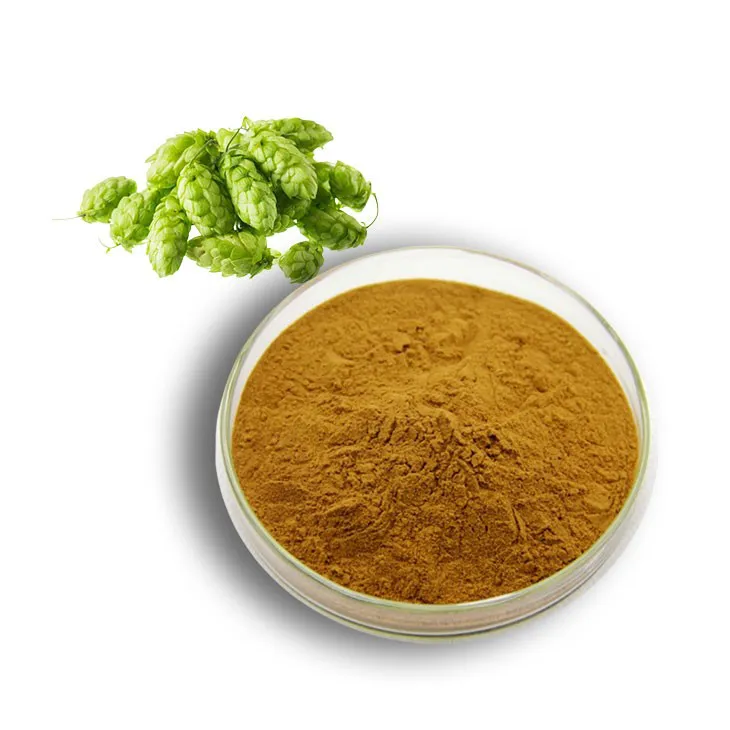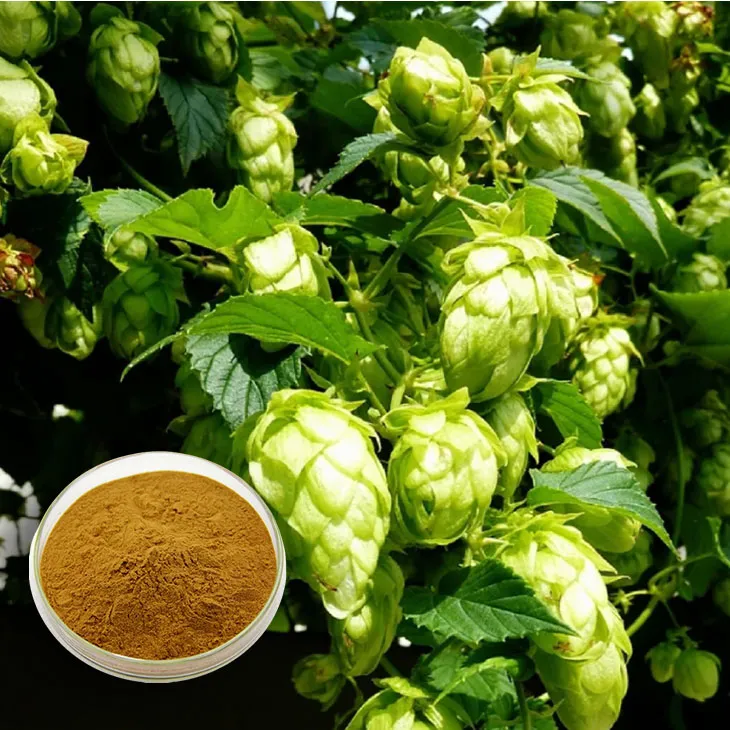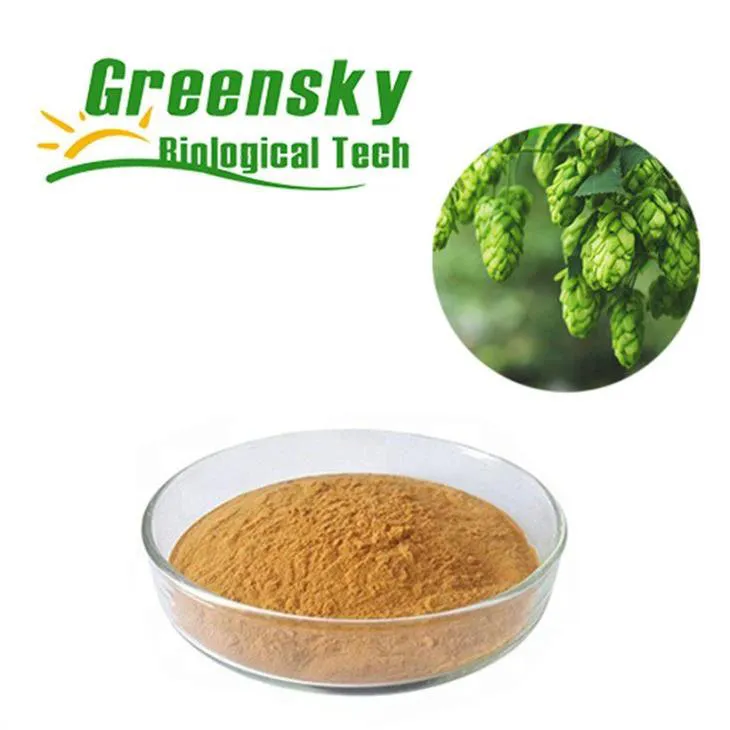- 0086-571-85302990
- sales@greenskybio.com
Organic supercritical CO₂ extraction of hops extract.
2024-11-27

Introduction
The extraction of Hops Extract using organic supercritical CO₂ is a cutting - edge technology in the field of brewing and natural product extraction. Hops are a crucial ingredient in beer production, contributing to its bitterness, flavor, and aroma. The traditional methods of extracting hops components have certain limitations, which are being overcome by the supercritical CO₂ extraction technique.

Properties of Supercritical CO₂
Supercritical CO₂ is a state of carbon dioxide where it exhibits properties that are intermediate between those of a gas and a liquid. Near its critical point (temperature of approximately 31.1 °C and pressure of approximately 73.8 bar), CO₂ becomes supercritical. In this state, it has a high diffusivity like a gas, allowing it to penetrate the matrix of the hops easily. At the same time, it has a density similar to that of a liquid, which enables it to dissolve a wide range of substances effectively.

Advantages of Supercritical CO₂ Extraction in Hops Extract Production
Clean and Environment - Friendly
One of the most significant advantages of using supercritical CO₂ for Hops Extract extraction is that it is an environment - friendly solvent. Unlike some traditional organic solvents, CO₂ is non - toxic, non - flammable, and leaves no harmful residues in the final product. This is of utmost importance in the production of organic beer ingredients, as it meets the strict standards of organic certification. Organic beer consumers are increasingly demanding products that are free from chemical contaminants, and supercritical CO₂ extraction helps to fulfill this requirement.
Selective Extraction
The supercritical CO₂ extraction process can be highly selective. Hops contain a variety of compounds, including alpha - acids, beta - acids, and essential oils. These components play different roles in beer. For example, alpha - acids are responsible for the bitterness, beta - acids contribute to the flavor stability, and essential oils provide the characteristic aroma. Supercritical CO₂ can be tuned to selectively extract these desired compounds, depending on the pressure, temperature, and other extraction parameters. This selectivity allows for the production of hops extracts with specific flavor and bitterness profiles, which can be tailored to different beer styles.
Mild Operating Conditions
Compared to traditional extraction methods such as solvent extraction or steam distillation, supercritical CO₂ extraction can operate at relatively mild temperatures. Traditional methods often involve high temperatures that can cause the degradation of heat - sensitive components in hops. For instance, some of the delicate essential oils and certain acid isomers may be altered or lost during high - temperature extraction. Supercritical CO₂ extraction, on the other hand, can be carried out at temperatures close to room temperature (usually in the range of 30 - 50 °C), which helps to preserve the integrity of these heat - sensitive components. As a result, a more pure and potent hops extract is obtained, which can enhance the overall quality of beer production.

The Extraction Process
Pre - treatment of Hops
Before the supercritical CO₂ extraction, the hops need to be properly pre - treated. This usually involves drying and grinding the hops to a suitable particle size. Drying helps to reduce the moisture content, which can interfere with the extraction process. Grinding the hops into a fine powder increases the surface area available for extraction, allowing for more efficient contact between the hops and the supercritical CO₂.
Extraction Parameters
The extraction process is highly dependent on several parameters:
- Pressure: The pressure of the supercritical CO₂ plays a crucial role in determining the solubility of the hops components. Higher pressures generally increase the solubility, but too high a pressure may also lead to the extraction of unwanted compounds. Typically, pressures in the range of 100 - 300 bar are used for hops extract extraction.
- Temperature: As mentioned earlier, the temperature is maintained at a relatively mild level. However, small variations in temperature can also affect the selectivity of the extraction. A slightly higher temperature may increase the diffusivity of CO₂ but may also reduce the solubility of some components.
- Flow Rate: The flow rate of supercritical CO₂ through the extraction vessel is another important parameter. A higher flow rate can ensure better mass transfer, but it also requires more energy for pumping the CO₂.
- Extraction Time: The length of time that the hops are exposed to the supercritical CO₂ affects the yield and quality of the extract. Longer extraction times may increase the yield, but it may also lead to the extraction of less desirable components over time.
Separation and Collection
After the extraction, the supercritical CO₂ containing the dissolved hops components needs to be separated from the extract. This is typically achieved by reducing the pressure of the CO₂. As the pressure is decreased, the CO₂ reverts to its gaseous state, leaving behind the concentrated hops extract. The separated CO₂ can then be recycled and reused in the extraction process, which is another advantage of this method from an environmental and economic perspective.
Quality and Composition of the Hops Extract
The hops extract obtained through supercritical CO₂ extraction has a high quality in terms of its chemical composition. The alpha - acids and beta - acids are well - preserved, and the essential oils are present in their natural state. The purity of the extract is also relatively high, as there are no contaminating residues from solvents. This pure and high - quality extract can be used in various forms in beer production. For example, it can be added directly to the brewing kettle, or it can be used in the form of hop pellets or extracts in the dry - hopping process to enhance the aroma and flavor of the beer.
Applications in Beer Production
In beer production, the use of supercritical CO₂ - extracted hops extract offers several benefits:
- Consistency: The extract can be produced with a consistent composition, ensuring that the bitterness, flavor, and aroma contributions to the beer are reproducible batch after batch. This is especially important for large - scale commercial breweries that need to maintain a consistent product quality.
- Enhanced Flavor and Aroma: The pure and potent hops extract can impart a more intense and well - defined flavor and aroma to the beer. This can be particularly appealing to craft breweries that focus on creating unique and high - quality beer products.
- Flexibility: Brewers can use different types of hops extracts with varying compositions to create a wide range of beer styles. They can also adjust the amount of extract added at different stages of the brewing process to fine - tune the final product.
Economic and Environmental Considerations
Economic
Although the initial investment in supercritical CO₂ extraction equipment may be relatively high, there are long - term economic benefits. The recyclability of CO₂ reduces the cost of the solvent over time. Moreover, the high - quality extracts produced can command a higher price in the market, especially in the growing market for organic and high - end beer products. Additionally, the consistency of the extract can lead to fewer production losses due to off - spec products.
Environmental
From an environmental perspective, the use of supercritical CO₂ is highly beneficial. As mentioned earlier, it is a non - toxic and non - flammable solvent that leaves no harmful residues. The recyclability of CO₂ also reduces its environmental impact. Compared to traditional solvent - based extraction methods, supercritical CO₂ extraction has a lower carbon footprint, which is increasingly important in the context of sustainable brewing practices.
Conclusion
Organic supercritical CO₂ extraction of hops extract is a highly promising technique in the brewing industry. It offers numerous advantages over traditional extraction methods, including environmental friendliness, selectivity, and the ability to produce high - quality extracts. The resulting hops extracts can enhance the quality of beer production in terms of flavor, aroma, and consistency. While there are some initial economic considerations, the long - term benefits in terms of both economics and environmental sustainability make it an attractive option for breweries, especially those aiming to produce high - quality and organic beer products.
FAQ:
What are the main advantages of organic supercritical CO₂ extraction of hops extract?
There are several main advantages. Firstly, supercritical CO₂ is a clean and environmentally - friendly solvent, leaving no harmful residues in the final product, which is crucial for high - quality organic beer ingredients. It can selectively target desired compounds in hops like alpha - acids, beta - acids, and essential oils responsible for beer's bitterness, flavor, and aroma. Also, compared to traditional methods, it can operate at relatively mild temperatures, preventing the degradation of heat - sensitive components, resulting in a more pure and potent hops extract for better beer production.
How does supercritical CO₂ selectively extract components from hops?
The unique properties of supercritical CO₂ near the critical point, between gas and liquid states, allow it to interact with different components in hops in a selective way. It can target specific compounds such as alpha - acids, beta - acids, and essential oils. The solubility of these components in supercritical CO₂ varies, enabling the separation and extraction of the desired substances while leaving others behind.
Why is it important that supercritical CO₂ extraction leaves no harmful residues?
It is important because in the production of organic beer ingredients, any harmful residues can affect the quality and purity of the final product. Organic products are expected to be free from contaminants, and for beer, this is crucial as it directly impacts the taste, aroma, and safety of the beverage. Also, it meets the requirements of organic production standards.
How does the relatively mild temperature in supercritical CO₂ extraction benefit the hops extract?
The relatively mild temperature is beneficial as it prevents the degradation of heat - sensitive components in hops. Components such as alpha - acids, beta - acids, and essential oils are sensitive to high temperatures. By operating at milder temperatures, these components remain intact, resulting in a more pure and potent hops extract that can enhance the overall quality of beer production.
Can supercritical CO₂ extraction be used for other plant extracts besides hops?
Yes, supercritical CO₂ extraction can be used for other plant extracts. Its properties make it suitable for extracting valuable components from a variety of plants. However, the extraction parameters may need to be adjusted depending on the nature of the plant and the components to be extracted.
Related literature
- Supercritical Fluid Extraction of Hops: A Review"
- "Advances in Organic Hops Extraction Using Supercritical CO₂"
- "The Role of Supercritical CO₂ in Hops Extract Production for High - Quality Beer"
- ▶ Hesperidin
- ▶ Citrus Bioflavonoids
- ▶ Plant Extract
- ▶ lycopene
- ▶ Diosmin
- ▶ Grape seed extract
- ▶ Sea buckthorn Juice Powder
- ▶ Fruit Juice Powder
- ▶ Hops Extract
- ▶ Artichoke Extract
- ▶ Mushroom extract
- ▶ Astaxanthin
- ▶ Green Tea Extract
- ▶ Curcumin
- ▶ Horse Chestnut Extract
- ▶ Other Product
- ▶ Boswellia Serrata Extract
- ▶ Resveratrol
- ▶ Marigold Extract
- ▶ Grape Leaf Extract
- ▶ New Product
- ▶ Aminolevulinic acid
- ▶ Cranberry Extract
- ▶ Red Yeast Rice
- ▶ Red Wine Extract
-
Longan Extract
2024-11-27
-
Bayberry Extract
2024-11-27
-
Lotus leaf extract
2024-11-27
-
Motherwort Extract
2024-11-27
-
Tongkat Ali Extract
2024-11-27
-
Licorice Root Extract Powder
2024-11-27
-
Beetroot Powder
2024-11-27
-
Pine bark Extract Powder
2024-11-27
-
Troxerutin
2024-11-27
-
Nettle leaf extract
2024-11-27





















